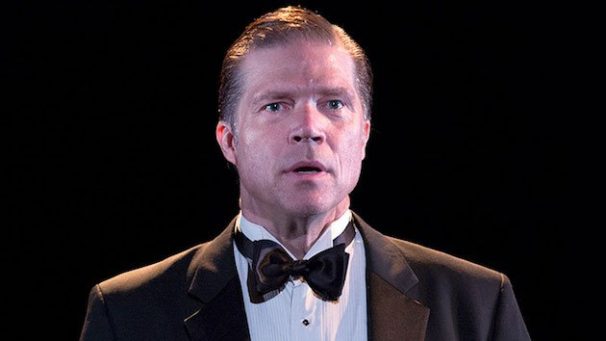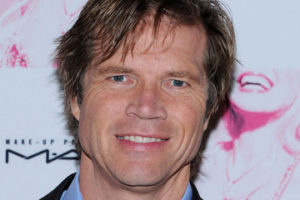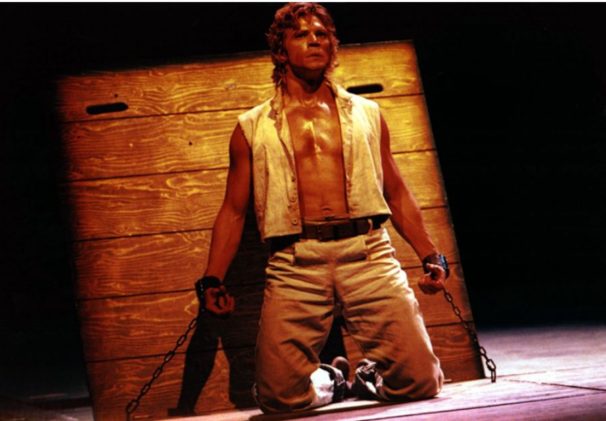
Ed. note: An interview with L.A. Opera guest singer Rod Gilfrey by Gary Murphy first published in the “Bravo” newsletter of the Opera League of Los Angeles.
♣ ♣ ♣ ♣
After reprising his role as Mr. Potter in Jake Heggie’s opera adaptation of It’s A Wonderful Life at San Francisco Opera in December, baritone Rod Gilfry returns to Los Angeles for yet another role premiere in the loser, an intense tour-de-force and daringly staged one-act opera from Pulitzer Prize-winning composer David Lang. Based on the novel by Austrian writer Thomas Bernhard, the loser tells the tale of a failed piano student who recounts a life lived in the shadows of his famous friend Glenn Gould. This painful meditation on dreams forsaken and hopes unrealized unfolds in an unusually intimate staging that incorporates multiple levels of the spectacular Theatre at Ace Hotel in Downtown Los Angeles.
Rod recently chatted about the West Coast premiere of the loser, an intimate work for baritone, piano and chamber ensemble, plus a few of his LA Opera memories.
Gary Murphy: David Lang’s the loser is an intriguing role choice — a 65-minute sung monologue performed on a platform above the orchestra.
Rod Gilfry: It is just me on a 4’ x 4’ platform perched 20 feet in the air. I’m simply standing, dressed in a tuxedo. The material doesn’t seem a likely candidate for an opera or a dramatic setting, but David Lang finds these odd vehicles and makes great theater from them. He saw something in Thomas Bernhard’s novel, the loser, and thought it would make a good opera piece.
You play one of two piano students who were in school with Glenn Gould.
RG: Yes, there are three characters in the book — Glenn Gould, who has just died, and Wertheimer, who has just killed himself. The survivor of the trio is the Narrator who never reveals his name. It’s interesting how the book is written in these massively long paragraphs, each one its own chapter. That’s a style of Thomas Bernhard; it’s one of his literary idiosyncrasies.
The tension must be high, as you are standing on a small raised platform above the stage.
RG: It’s a fascinating piece, and many people have told me how captivated they are in the theater. The platform I stand on is built above the orchestra section of the house which is empty—no one sits there. Everyone sits in the mezzanine, and I am eye to eye with the audience with the bare main stage behind me.
It’s only in the last five minutes of my monologue that a light comes up onstage revealing a beautiful grand concert piano and a pianist lightly playing a vague impression of a Bach piece. Maybe it’s Bach, perhaps a bit of the “Goldberg Variations.” David has written it as a very loose and lovely, somewhat mysterious, interpretation of a Bach composition.
You just wrapped It’s A Wonderful Life in San Francisco where you reprised the role of Mr. Potter that you originated at Houston Grand Opera. You seem to enjoy creating new roles and recently did so in Crossing here at LA Opera. Is it harder to create new roles versus finding your character in well-known roles?

RG: It’s a totally different process. One of the things about doing a new role is that it’s a blank slate. You can figure out your own way through it, and then you’re the original one that everyone else goes from. You’re the point of departure.
Whereas if you do a familiar role, then you must honor tradition whilst somehow making it distinctively yours. Though I have to say … there is not much latitude in any classical vocal music. By the time the composer has set the text, about 95% of your choices have been decided by the composer — in terms of speed, rise and fall of the line, where you pause, the dynamic. All those elements are pre-determined by the composer so the leeway you have for interpreting is only about 5% as opposed to an actor where you can essentially be the composer.

The Opera League has been a friend over many years. Is there one moment that stands out?
RG: Most certainly. The one thing I totally remember was in 2000 when I was performing Billy Budd, a role I had been singing all over the world. It was the last opera of Peter Hemmings’ last season, and it always had been his dream to have Billy Budd in Los Angeles. It was the Opera League that stood up and guaranteed they would find enough funding to ensure the Billy Budd production. As it turned out, it was not only Peter’s last production at LA Opera, it was also the last time I performed Billy. It was all so poignant.
Gary W. Murphy is a performing arts consultant.
the loser | L.A. Opera | Theatre at Ace Hotel | Feb 22, 23
